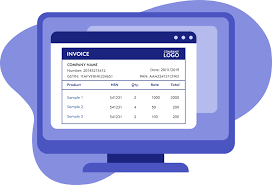In today’s fast-paced business world, staying on top of finances is more critical than ever. Whether you’re a startup or an established enterprise, managing your books efficiently can be the key to growth and sustainability. This is where accounting software for businesses becomes a game-changer.
What is Accounting Software?
Accounting software is a type of application that helps businesses record, process, and manage financial transactions. It replaces the traditional methods of bookkeeping with automated tools, providing real-time insights and better financial control.
Why Businesses Need Accounting Software
Financial management is not just about recording sales and expenses. It’s about compliance, strategic planning, and ensuring profitability. Here’s why accounting software is essential for modern businesses:
- Accuracy: Reduces human errors in calculations.
- Efficiency: Automates repetitive tasks like invoicing and payroll.
- Compliance: Helps in tax preparation and meeting legal requirements.
- Decision-making: Offers financial insights to make informed choices.
Key Features to Look for in Accounting Software
When selecting an accounting solution, businesses should consider the following features:
1. Cloud-Based Access
Cloud-based accounting software allows users to access financial data from anywhere. This is especially useful for remote teams and business owners who travel frequently.
2. Real-Time Reporting
Up-to-date financial reports provide clear visibility into a company’s performance. Look for software that offers dashboards, charts, and downloadable reports.
3. Invoicing and Billing
Automated invoicing features help maintain professionalism and ensure timely payments.
4. Bank Reconciliation
This feature matches your bank statements with your books, identifying any discrepancies quickly.
5. Inventory Management
Some accounting platforms also offer inventory tracking, ideal for businesses that sell products.
Benefits of Using Accounting Software
Improved Productivity
With automation handling data entry, calculations, and reporting, your finance team can focus on analysis and strategic planning.
Cost Savings
Although there’s an upfront cost, accounting software reduces the need for additional staff and helps avoid penalties from late filings or errors.
Better Cash Flow Management
Real-time tracking of payables and receivables ensures that you maintain a healthy cash flow.
Scalability
As your business grows, so do your accounting needs. Most accounting software offers scalable packages that grow with your company.
Best Practices for Using Accounting Software
To get the most out of your accounting software:
- Keep it Updated: Regular updates ensure you have the latest features and security patches.
- Integrate with Other Systems: Integrating with CRM or e-commerce platforms can improve data accuracy.
- Train Your Team: Make sure users understand the software to use it effectively.
- Set Access Controls: Limit access based on user roles to protect sensitive data.
Common Types of Accounting Software
Small Business Accounting Software
Designed for sole proprietors or small teams, this type offers basic features like invoicing, expense tracking, and tax filing.
Enterprise Resource Planning (ERP) Systems
For large businesses, ERP systems offer integrated solutions that combine accounting, inventory, HR, and more.
Industry-Specific Software
Some software is tailored to the unique needs of industries like retail, construction, or healthcare.
Choosing the Right Accounting Software
Choosing the best accounting software depends on your business size, industry, and specific needs. Consider:
- User Interface: Is it easy to use and navigate?
- Support and Training: Does the provider offer tutorials or customer support?
- Cost: Is the pricing structure transparent and within your budget?
- Security: Does it offer data encryption and regular backups?
For businesses seeking a robust, user-friendly accounting solution, Giddh accounting software offers advanced features like cloud-based access, real-time reporting, and seamless integration with other tools.
Accounting Software Trends in 2025
The accounting landscape continues to evolve. Here are a few trends shaping the future:
Artificial Intelligence and Automation
AI-driven software is improving the accuracy and efficiency of bookkeeping by identifying patterns and predicting financial outcomes.
Blockchain for Security
Blockchain technology offers enhanced security and transparency in financial transactions.
Mobile Accounting
Mobile apps now allow business owners to manage their finances on the go, improving responsiveness and flexibility.
Integrations that Enhance Accounting Software
Modern accounting software should integrate easily with:
- Banking Platforms: For automated bank feeds and reconciliations.
- E-Commerce Stores: To sync sales, taxes, and inventory.
- Payroll Systems: For accurate and timely salary disbursements.
- CRM Tools: For syncing customer invoices and payments.
Challenges Businesses Face Without Accounting Software
Still managing books with spreadsheets or paper? Here’s what you’re risking:
- Inaccurate Records: Manual entry increases the chance of errors.
- Missed Deadlines: Lack of automation can lead to late payments and filings.
- Limited Insights: Without real-time data, decision-making is hindered.
- Security Issues: Paper records or unsecured files can be easily compromised.
Final Thoughts
Accounting software is no longer a luxury—it’s a necessity for businesses that want to stay competitive, organized, and profitable. With the right tools in place, companies can automate tedious processes, ensure compliance, and focus on growth.
Choosing a reliable and comprehensive platform like Accounting Software for Businesses can simplify financial management and give you a clear view of your business’s health.

